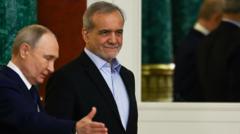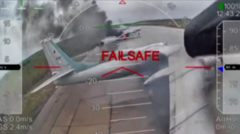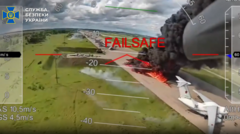Russia and Iran have formalized a significant military partnership, marking a pivotal shift in their diplomatic relations as the two nations have signed a comprehensive 20-year treaty aimed at enhancing cooperation across various spheres, including defense, technology, and energy.
Strengthening Alliances: Russia and Iran Forge Military Partnership

Strengthening Alliances: Russia and Iran Forge Military Partnership
Moscow and Tehran solidify ties with a 20-year strategic treaty encompassing defense, energy, and trade.
In a landmark ceremony, Russian President Vladimir Putin and Iranian President Masoud Pezeshkian laid the groundwork for a new chapter of collaboration in military affairs during Pezeshkian's visit to Moscow. This treaty underscores both countries' determination to address military and security challenges through consultation and joint exercises, reinforcing their defense capabilities against external threats.
The partnership not only consolidates military ties but also holds potential for extensive growth in trade, particularly within the energy sector. During their joint press conference, President Putin indicated Russia's interest in developing new nuclear power units in Iran and expediting the sale of surplus gas to the Iranian market. This follows a significant decline in European gas imports from Russia post the Ukraine invasion, pushing Moscow to seek alternative customers.
Moreover, the two nations are negotiating a potential gas pipeline that would enable Russia to supply Iran with up to 55 billion cubic meters of gas annually, significantly enhancing the economic ties between them. The pipeline is anticipated to traverse Azerbaijani territory if completed, illustrating the complex geopolitical dynamics at play in the region.
As global power structures continue to shift, the evolving partnership between Russia and Iran signifies a strategic realignment in response to increased isolation from Western nations, paving the way for deeper military and economic collaborations moving forward.
The partnership not only consolidates military ties but also holds potential for extensive growth in trade, particularly within the energy sector. During their joint press conference, President Putin indicated Russia's interest in developing new nuclear power units in Iran and expediting the sale of surplus gas to the Iranian market. This follows a significant decline in European gas imports from Russia post the Ukraine invasion, pushing Moscow to seek alternative customers.
Moreover, the two nations are negotiating a potential gas pipeline that would enable Russia to supply Iran with up to 55 billion cubic meters of gas annually, significantly enhancing the economic ties between them. The pipeline is anticipated to traverse Azerbaijani territory if completed, illustrating the complex geopolitical dynamics at play in the region.
As global power structures continue to shift, the evolving partnership between Russia and Iran signifies a strategic realignment in response to increased isolation from Western nations, paving the way for deeper military and economic collaborations moving forward.























